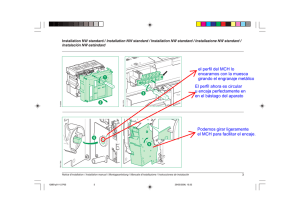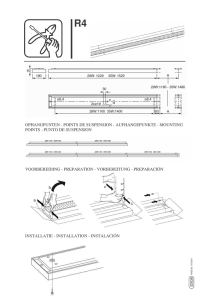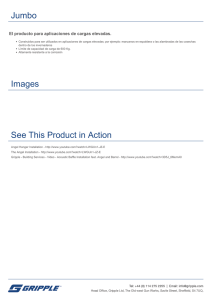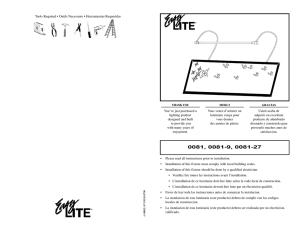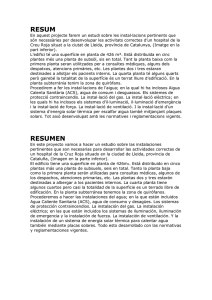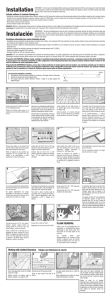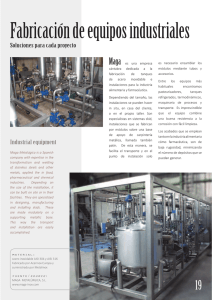Installation Instructions Instrucciones de instalación
Anuncio
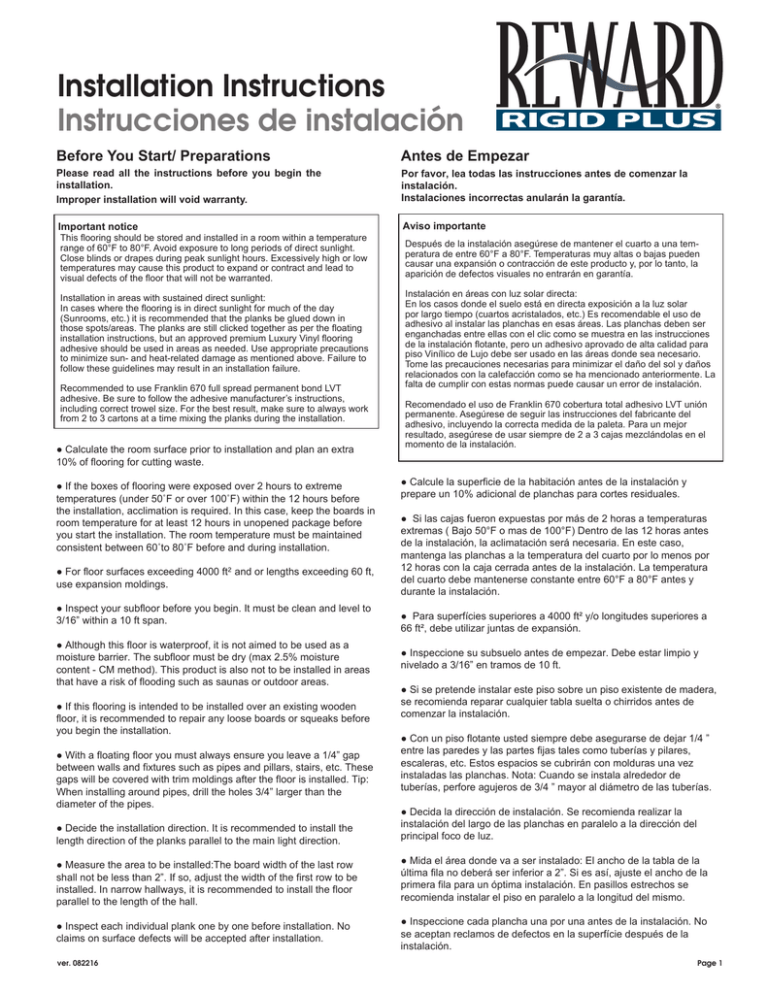
Before You Start/ Preparations Please read all the instructions before you begin the installation. Improper installation will void warranty. 2015.09.02 EN Installation instructions Installation Instructions ES Instrucciones de Instalación Instrucciones de instalación Antes de Empezar Por favor, lea todas las instrucciones antes de comenzar la instalación. Instalaciones incorrectas anularán la garantía. Important notice This flooring shouldmake be stored in aroom roomwithin within aa temperature After installation, sureand to installed keep the temperature range of 60°F to 80°F. Avoid exposure to long periods of direct sunlight. range of 60°F to 80°F. Excessively high or low temperatures may Close blinds or drapes during peak sunlight hours. Excessively high or low cause this product to expand or contract andorlead to visual defects temperatures may cause this product to expand contract and lead to of the floor that will notfloor be warranted. visual defects of the that will not be warranted. Aviso importante Despuésde delalainstalación instalación asegúrese de mantener el cuarto una Después asegúrese de mantener el cuarto a una atemtemperatura de entre 80°F. Temperaturas altas o bajas peratura de entre 60°F a60°F 80°F.aTemperaturas muy altasmuy o bajas pueden causar expansión o contracción de este producto y, por lo tanto,y, la por puedenuna causar una expansión o contracción de este producto aparición de aparición defectos visuales no entrarán en no garantía. lo tanto, la de defectos visuales entrarán en garantía. Installation in direct sunlight: Installation inareas areaswith withsustained sustained direct sunlight: In cases where the flooring is in direct sunlight for much of the day In cases where the flooring is in direct sunlight much of inthe day (Sunrooms, etc.) it is recommended that the planks befor glued down (Sunrooms, etc.) itThe is recommended that the planks down in those spots/areas. planks are still clicked together asbe perglued the floating installation instructions, butplanks an approved premium Luxury Vinyl flooring those spots/areas. The are still clicked together as per the adhesiveinstallation should be used in areas but as needed. Use appropriate precautions floating instructions, an approved premium Luxury Vinyl to minimize sun- and heat-related damage as mentioned above. Failure to flooring adhesive should be used in areas as needed. Be sure to follow follow these guidelines may result in an installation failure. the adhesive manufacturer’s instructions, including correct trowel size. Instalación en áreas con luz solar directa: Instalación áreas con luz solar directa: En los casosen donde el suelo está en directa exposición a la luz solar por tiempo (cuartos acristalados, Es recomendable En largo los casos donde el suelo está enetc.) directa exposición a ellauso luz de solar adhesivo instalar(cuartos las planchas en esas áreas. planchas deben el seruso por largoaltiempo acristalados, etc.) Las Es recomendable enganchadas ellas con el clic como muestra en Las las instrucciones de adhesivo entre al instalar las planchas enseesas áreas. planchas de la instalación flotante, pero un adhesivo aprovado de alta calidad para deben ser enganchadas entre ellas el clicdonde comosea se muestra piso Vinílico de Lujo debe ser usado en con las áreas necesario.en las instrucciones de lanecesarias instalación flotante, peroel un adhesivo Tome las precauciones para minimizar daño del sol y daños relacionados calefacción ha mencionado anteriormente. aprovado decon altalacalidad paracomo piso se Vinílico de Lujo debe ser usadoLa falta de áreas cumplirdonde con estas puede de instalación. en las sea normas necesario. Decausar seguirun laserror instrucciones del Recommended to use Franklin 670 full spread permanent bond LVT adhesive. Be result, sure to make follow the manufacturer’s For the best sureadhesive to always work from 2instructions, to 3 cartons at a including correct trowel size. Forthe theinstallation. best result, make sure to always work time mixing the planks during from 2 to 3 cartons at a time mixing the planks during the installation. ● Calculate the room surface prior to installation and plan an extra 10% of flooring for cutting waste. ● If the boxes of flooring were exposed over 2 hours to extreme temperatures (under 50˚F or over 100˚F) within the 12 hours before the installation, acclimation is required. In this case, keep the boards in room temperature for at least 12 hours in unopened package before you start the installation. The room temperature must be maintained consistent between 60˚to 80˚F before and during installation. ● For floor surfaces exceeding 4000 ft2 and or lengths exceeding 60 ft, use expansion moldings. ● Inspect your subfloor before you begin. It must be clean and level to 3/16” within a 10 ft span. ● Although this floor is waterproof, it is not aimed to be used as a moisture barrier. The subfloor must be dry (max 2.5% moisture content - CM method). This product is also not to be installed in areas that have a risk of flooding such as saunas or outdoor areas. ● If this flooring is intended to be installed over an existing wooden floor, it is recommended to repair any loose boards or squeaks before you begin the installation. ● With a floating floor you must always ensure you leave a 1/4” gap between walls and fixtures such as pipes and pillars, stairs, etc. These gaps will be covered with trim moldings after the floor is installed. Tip: When installing around pipes, drill the holes 3/4” larger than the diameter of the pipes. fabricante de pegamento, incluyendo la correcta medida de launión paleta. Recomendado el uso de Franklin 670 cobertura total adhesivo LVT permanente. Asegúrese de seguir las instrucciones del fabricante del Para un mejor resulatdo, asegúrese siempre adhesivo, incluyendo la correcta medidade de usar la paleta. Paraplanchas un mejor de 2 o resultado, asegúrese de en usar de de 2 a la 3 cajas mezclándolas en el 3 cajas mezclándolas elsiempre momento instalación. momento de la instalación. ● Calcule la superficie de la habitación antes de la instalación y prepare un 10% adicional de planchas para cortes residuales. ● Si las cajas fueron expuestas por más de 2 horas a temperaturas extremas ( Bajo 50°F o mas de 100°F) Dentro de las 12 horas antes de la instalación, la aclimatación será necesaria. En este caso, mantenga las planchas a la temperatura del cuarto por lo menos por 12 horas con la caja cerrada antes de la instalación. La temperatura del cuarto debe mantenerse constante entre 60°F a 80°F antes y durante la instalación. ● Para superfícies superiores a 4000 ft² y/o longitudes superiores a 66 ft², debe utilizar juntas de expansión. ● Inspeccione su subsuelo antes de empezar. Debe estar limpio y nivelado a 3/16” en tramos de 10 ft. ● Si se pretende instalar este piso sobre un piso existente de madera, se recomienda reparar cualquier tabla suelta o chirridos antes de comenzar la instalación. ● Con un piso flotante usted siempre debe asegurarse de dejar 1/4 ” entre las paredes y las partes fijas tales como tuberías y pilares, escaleras, etc. Estos espacios se cubrirán con molduras una vez instaladas las planchas. Nota: Cuando se instala alrededor de tuberías, perfore agujeros de 3/4 ” mayor al diámetro de las tuberías. ● Decide the installation direction. It is recommended to install the length direction of the planks parallel to the main light direction. ● Decida la dirección de instalación. Se recomienda realizar la instalación del largo de las planchas en paralelo a la dirección del principal foco de luz. ● Measure the area to be installed:The board width of the last row shall not be less than 2”. If so, adjust the width of the first row to be installed. In narrow hallways, it is recommended to install the floor parallel to the length of the hall. ● Mida el área donde va a ser instalado: El ancho de la tabla de la última fila no deberá ser inferior a 2”. Si es así, ajuste el ancho de la primera fila para un óptima instalación. En pasillos estrechos se recomienda instalar el piso en paralelo a la longitud del mismo. ● Inspect each individual plank one by one before installation. No claims on surface defects will be accepted after installation. ● Inspeccione cada plancha una por una antes de la instalación. No se aceptan reclamos de defectos en la superfície después de la instalación. ver. 082216 ● Due to the speed of sudden temperature changes, which has the potential to negatively affect this flooring, it is not recommended to install over any electrical radiant heating system. Installation over ● Debido a los cambios bruscos de temperatura, lo cual puede potencialmente de afectar negativamente estos pisos, no se Page 1 ● Inspect each individual plank one by one before installation. No claims on surface defects will be accepted after installation. ● Due to the speed of sudden temperature changes, which has the potential to negatively affect this flooring, it is not recommended to install over any electrical radiant heating system. Installation over electrical radiant heating systems will not be covered by the manufacturer’s warranty. Below instructions are for radiant heating systems using water. Ensure the radiant heat surface temperature never exceeds 81°F. Before installing over newly constructed radiant heat systems, operate the system at maximum capacity to force any residual moisture from the cementitious topping of the radiant heat system. The maximum moisture content of the screed is 1.5% (CM method). Shut down the floor heating at least 48 hours prior to installation. Make sure that the temperature in the room is at least 60°F during installation. It is recommended that the radiant heat be applied in a gradual manner after installing the floor. Refer to the radiant heat system’s manufacturer recommendations for additional guidance. Tools and supplies required ● Spacers ● Rubber Mallet ● Ruler ● Pencil ● Tape Measure ● Utility Knife 1 After thoroughly cleaning the subfloor, you should begin laying from left to right. Place the floorboard 1/4” from the left wall. Use spacers between the wall and the floorboard. Luego de limpiar bien el subsuelo, comience colocando en la esquina el piso a 1/4” de la pared. Utilice espaciadores entre la pared y el piso. ● Inspeccione cada plancha una por una antes de la instalación. No se aceptan reclamos de defectos en la superfície después de la instalación. ● Debido a los cambios bruscos de temperatura, lo cual puede potencialmente de afectar negativamente estos pisos, no se recomienda su instalación sobre sistemas eléctricos de calefacción. La instalación sobre sistemas eléctricos de calefacción no será cubierta por la garantía del fabricante. Las instrucciones siguientes son para sistemas de calefacción de agua. Asegúrese de que la temperatura de la superficie caliente nunca supere los 81°F. Antes de instalar sobre sistemas de calefacción nuevos, encienda el sistema a su máxima capacidad para eliminar la humedad residual del relleno de cemento. La humedad máxima de la superficie caliente debe ser 1,5% (método CM). Apague la calefacción por lo menos 48 horas antes de la instalación. Asegúrese de que la temperatura de la habitación sea de al menos 60°F durante la instalación. Se recomienda que el calor de la calefacción sea gradual después de instalar el piso. Consulte con el fabricante de su sistema de calefacción para una orientación adicional. Herramientas y artículos necesarios ● Espaciadores ● Mazo de goma ● Regla ● Lápiz ● Cinta de medir ● Cuchillo 2 Insert the end section of the next floorboard at an angle to the first one, then lay down. Complete the first row in the same manner. 3 At the end of the first row, leave an expansion gap of 1/4" to the wall and measure the length of the last plank to fit. Inserte la sección final de la siguiente plancha en ángulo con la primera, y luego déjelo apoyar en el piso. Complete la primera fila del mismo modo. Al final de la última fila, dejar un espacio a 1/4” de la pared y mida el largo de la última plancha a encajar. >12” 4 To cut the plank, use a simple utility knife and ruler, and with the top side facing up, cut heavily and several times on the same axis. The knife will not go through the surface but make a deep cut. You can then lift one half of the plank using your other hand to hold down the second placing it very close to the cut. The plank will split naturally. Para cortar la plancha, use un cuchillo y una regla, y con la cara hacia arriba, cortar duro y repitiendo varias veces en la misma parte. El cuchillo no traspasará la superficie pero hará un corte profundo. Luego se puede levantar una mitad de plancha usando la otra mano para sostener abajo la otra mitad, muy cerca del corte. Así la plancha se separará naturalmente. 5 Start the second row with the leftover cut part of the last plank of the previous row. This small plank should measure at least 12”. Otherwise, use another plank that should be cut in two. The end joints of each adjoining row should not be closer than 8" to each other. Comience la segunda fila con la parte cortada de la última tabla de la fila anterior. Este Pequeño tablón debe medir al menos 12 ”. De lo contrario, puede usar otro de los tablones y debe cortarlo en dos. En cualquier la distancia entre las juntas de los extremos de cada fila contigua no debe ser menor de 8''. Page 2 tablones y debe cortarlo en dos. En cualquier la distancia entre las juntas de los extremos de cada fila contigua no debe ser menor de 8''. 6 Lock the short end of the floorboard by inserting the tongue into the groove at an angle and dropping it into place. IMPORTANT: Make sure it is tightly locked with no gap.Then slide the floorboard towards the previously installed row until the tongue just touches the groove. Bloquee el extremo corto de la plancha insertando la lengüeta en la ranura en un ángulo y soltándolo en su lugar. IMPORTANTE: Asegúrese de que está estrechamente apretados sin espacios. Luego, deslice la tabla del suelo hacia la fila previamente instalada hasta la lengua que toque ligeramente la ranura. 7 Lift both the current as well as the previous plank from this row. Position the board so that the long side of the board is close to the boards in the previous row and overlapping the groove of the boards in the previous row. Levante tanto la tabla actual, así como la anterior de esta fila. Coloque la plancha de modo que el lado largo esté cerca de las tablas en la fila anterior y en superposición a la ranura de las placas de la fila anterior. Helpful Hint 9 After finishing the angle angle installation of the row, use scrap pieces and a small hammer or rubber mallet to gently tap the planks into the click of the previous row to make sure they are tightly clicked together and make sure there is no gap between the long side of the planks installed. ANY GAPPING CAN COMPROMISE THE WHOLE INSTALLATION. 10 Consejo útil Una vez finalizada la instalación ángulo ángulo de la fila, use trozos residuales y un pequeño martillo o un mazo de goma para golpear ligeramente las planchas dentro del clic de la fila anterior y así asegurar que están estrechamente colocadas dentro del clic y que no hay espacio a lo largo de las planchas instaladas. CUALQUIER ESPACIO ENTRE LAS PLANCHAS PUEDE COMPROMETER TODA LA INSTALACIÓN. 12 Holes for pipes: measure the diameter of the pipe and drill a hole that is 7/8” larger. Saw off a piece as Then lay the sawed-off piece in place. After 2-3 rows. Adjust the distance to the front wall by leaving an expansion gap of 1/4”. Always ensure that the end joints are staggered at least 8”, both when in the same row as when from one row to the next one. dejando una espacio de expansión de 1/4 ”. extremos de los pisos estén escalonadas al menos 8”, tanto cuando está en la misma fila y cuando están en la siguiente fila. 13 Door molding and skirting: lay a board (with the decorative side down) next to the door molding and as shown in the figure. Then slide the floorboard under molding. 8 Angle up and push forwards until the boards lock together. Install the next planks as per picture No 6. Incline hacia arriba y empuje hacia delante hasta que las juntas se unan entre sí. Instale las siguientes tablas de acuerdo a la fotografía Núm. 6. 11 To lay the last row: position a loose board exactly on top of the last row laid. Place another board on top, with the tongue side touching the wall. Draw a line along the line to obtain of the required width. Insert this cut board against the wall. The last row should be at least 2” wide. The spacers can then be removed. Coloque la otra tabla en la parte superior, el lado de la lengüeta tocando la pared. Dibuje una línea a lo largo del borde estas tablas, con el propósito de marcar la primera tabla. Corte a lo largo de la línea para obtener el ancho requerido. Inserte esta tabla cortada contra la pared. La 2” espaciadores se podrán retirar. Page 3 las planchas instaladas. CUALQUIER ESPACIO ENTRE LAS PLANCHAS PUEDE COMPROMETER TODA LA INSTALACIÓN. 12 Holes for pipes: measure the diameter of the pipe and drill a hole that is 7/8” larger. Saw off a piece as Then lay the sawed-off piece in place. Agujeros para tuberías: medir el diámetro de la tubería y perforar un agujero de 7/8” de más. Serruche un en su sitio. Luego, coloque la pieza recortada en su lugar. espaciadores se podrán retirar. 13 Door molding and skirting: lay a board (with the decorative side down) next to the door molding and as shown in the figure. Then slide the floorboard under molding. Puerta y zócalo: colocar una tabla (con el lado decorativo hacia abajo) junto a la moldura de la puerta, como se muestra en la figura. Luego, deslice el piso bajo la puerta. Maintenance Mantenimiento ● Sweep or vacuum daily using soft bristle attachments. ● Clean up spills and excessive liquids immediately. ● Damp mop as needed and use cleaners recommended with no-wax or oil ● Protect floor from constant direct sunlight. Close blinds or drapes during peak sunlight hours ● Use proper floor protection devices such as felt protectors under furniture ● Use a mat at entrance ways (please ensure the mat doesn't have rubber backing). ● Do not use abrasive cleaners, bleach or wax to maintain the floor. ● Do not drag or slide heavy objects across the floor ● Barrer o aspirar a diario. ● Limpiar derrames y exceso de íquidos inmediatamente. ● Un trapero húmedo se puede usar cuando sea necesario; use productos de limpieza recomendados sin cera ni aceite. ● Proteger el suelo de constante luz solar directa. Cerrar cortinas y persianas durante las horas de más sol. ● Utilice la protección adecuada para pisos como trozo de alfombras debajo de los muebles. ● Hay disponibles molduras de coordinación para terminar el trabajo donde se necesitan ajustes de transición. ● No usar limpiadores abrasivos, cloro o cera para la manutención del suelo. ● No arrastre o deslice objetos pesados sobre el piso. Disassembling / Desmontaje First separate the full row by carefully lifting up and releasing it form the previous row. Then once the long sides are released, seperate each plank by folding up. Separe toda la fila con cuidado levantando y liberando toda la fila. Doble hacia arriba y suelte todo el lado largo. Page 4
